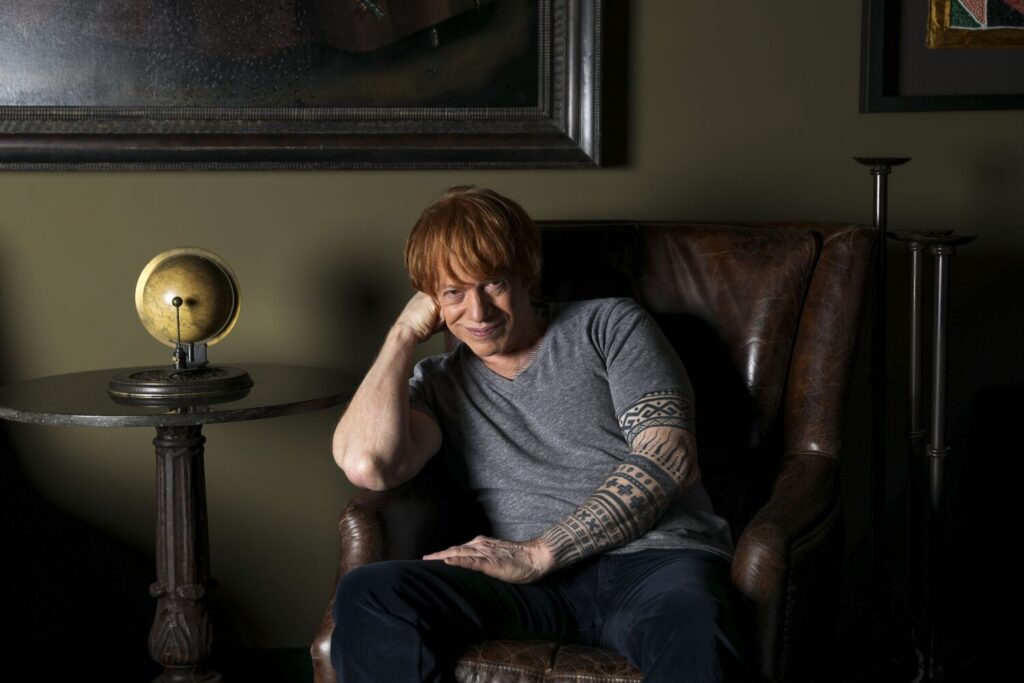Noah Baumbach had never worked with Danny Elfman before, but he’d pegged the composer well enough to think of him for “White Noise.” He said: “Danny, I’ve got the perfect film for you. It’s all about fear of death and how we deal with it. It’s right up your alley!”
Based on the 1985 novel by Don DeLillo, Baumbach’s film stars Adam Driver as Jack Gladney, a college professor of Hitler studies, and Greta Gerwig as his wife, Babette, in an eccentric portrait of American culture in the 1980s. It’s a heightened, almost impossible-to-define story about the false promises of the modern supermarket and pharmaceuticals and the inevitable destruction of humanity. You might say it’s a romantic comedic apocalyptic midlife-crisis murder thriller dance party.
“It was so cool to come on a project like this that had no genre to define what it was,” Elfman says. “To me, nothing is more exciting.”
It wasn’t just death anxiety that Baumbach recognized in Elfman — he seized on every facet of the composer’s split musical personality: both the wild rock ‘n’ roller from Oingo Boingo and the zany, gothic music act in Tim Burton’s cinematic circus, but also the sweet and dramatic serenader of such serious films as “Good Will Hunting” and “Milk.”
“I felt like, well, we went for it here — we should go for it in all departments,” Baumbach says. “Because it has an elevated tone, the music only helps that, and I think Danny’s music situates the audience in important ways throughout the movie, because it is maybe surprising how it shifts in tones.”
Baumbach felt that Elfman’s own 1980s roots fit the story’s zeitgeist, and in his varied work for Burton the music is “both taking the moments very seriously, but there’s an inherent sense of humor, I find, in Danny’s work.”
The director temporarily used Aaron Copland’s music in the college scenes, and he proposed fusing Copland Americana with ’80s electronica scores by the likes of Tangerine Dream. Elfman giddily started composing pieces inspired by those ingredients before he saw a frame of film — and by the time Baumbach showed him a rough cut it already had nearly 20 minutes of his original ideas on the soundtrack.
Elfman then invited Baumbach and his editor, Matthew Hannam, to move into his Los Angeles studio.
“It was really cool,” Elfman says, “because I was coming up with ideas, and I would just go ‘knock knock knock’ and get instant input. It was a very fertile period of time.”
Echoing the film, the score is a madcap blend of tones. At first it’s an upbeat, classical ode to academia, conveying the idealized, larger-than-life college where Jack rhapsodizes about Hitler, and Don Cheadle’s character sermonizes on Elvis and the art of the cinematic car crash. Elfman’s cues are appropriately theatrical, without “getting too silly.”
Then it turns into a doomsday disaster film, and Elfman’s score goes huge and heavy to accompany the dark toxic cloud that appears in the area and causes panic along with a breathless car chase. The synthesized homage to Tangerine Dream — “where I just really got to cut loose and have such a blast” — drives much of the final act, as Jack pursues a mysterious man who has further interrupted the peace in his life.
But as wild and cataclysmic as the story gets, its heart also beats with the relationship between Jack and Babette.
“There was early on a scene of just the two of them in bed talking,” Elfman says, “and that was a very informative scene.” He responded with a love theme for clarinet and strings and “tried to keep it really simple and sweet — because, to me, their relationship really was.”
Baumbach says he was “struck by how beautiful and romantic that music was,” and how it then expanded to accompany a confession scene that threatens to break the heart of their relationship — where “Danny’s music was just very generous and beautiful.”
The director has had an evolving relationship with music in his films, from the subtle, naturalistic days of “The Squid and the Whale,” to using retro French film music in “Frances Ha,” to inviting Randy Newman to write an unabashedly romantic score for “Marriage Story.”
He believes it’s all trended toward this — the most outrageous, theatrical and, at times, absurd film and score of his career.
“It’s all very complex,” says Baumbach. “And I love that it has this really great combination of orchestral and synthetic — which was the thing we talked about throughout the movie. The movie essentially plays in all of these different contrasts, you know, the natural world versus the commercial, plastic world. And Danny really embraced that musically.”
Both men said they would love to work together again, although Baumbach notes, “I probably will never have a movie with such varied tones.” Which means he’ll have to confine himself to just one of Danny Elfman’s personalities next time.
Says Baumbach: “We’ll find creative ways to get around it.”

